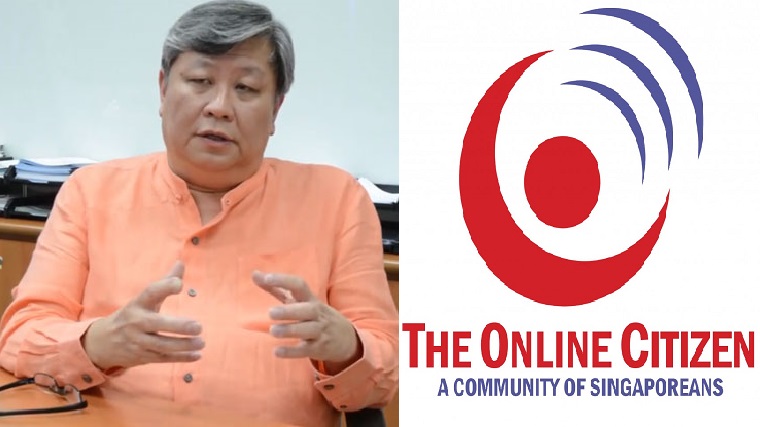Last Friday, MINDEF’s application for a Court Order under the Protection from Harassment Act (POHA) was granted.
Against who? Innovator and medical professional Dr Ting Choon Meng and five guys from socio-political site The Online Citizen - Howard Lee, Terry Xu, Andrew Loh, lawyer Choo Zeng Xi and Lee Song Kwang.
MINDEF being harassed by six guys?
A bit of context: Dr Ting lost his patent case against MINDEF and was assessed to have made false statements in his interview with TOC, which TOC subsequently published in January. Due to POHA, the statement requested by MINDEF had to be featured prominently in related TOC articles.
But here are three observations on why big big MINDEF need not feel too harassed by six Singaporean guys
1. Let's go slow with this new and "novel" legislation passed last year.
Law Minister K Shanmugam told young SMU law students at a criminal justice conference last August that POHA is a novel example in our justice system.
He highlighted the overwhelming public support for the government to deal with cyber harassment, with the act covering behaviours such as stalking and sexual harassment.
He also said that it was path-breaking because there was a complementary suite of remedies for victims, such as criminal penalties, obtaining protection orders or even expedited protection orders, to urgently stop the harassment either online or offline.
He also noted that the legislation is novel in some aspects:
"Section 15 for example allows victims to apply for an order that a publisher of falsehoods about that person must publish a notification to bring attention to the falsehood and set out the true facts" - Keynote Address by Law Minister K Shanmugam at NUS-SMU Criminal Justice Conference
Blogger Xiaxue has recently used POHA to successfully file a protection order against mega troll SMRT Ltd(Feedback). But we did not expect the next prominent "victim" to be MINDEF.
With these prominent cases, POHA appears to be used as a tool for bloggers to silence each other or for organisations to correct falsehoods.
But I wonder if we should go slow before setting all sorts of new precedents for POHA.
I'm not sure about you but I will be slightly embarrassed to tell people that MINDEF was one of first successful applicants to be granted the Protection from Harassment Act.
2. How about a request for the right of reply?
As POHA is a relatively new legislation, how has the government reacted against criticisms and falsehoods previously?
Enter the government's request for the right to reply, with a "stick" to restrict the publication's circulation under the Newspaper and Printing Presses Act.
As Deputy Prime Minister Tharman Shanmugaratnam explained in his recent dialogue session at St Gallen, Switzerland:
"We are unconventional in requiring in our laws that we have the right to reply. When foreign publications publish something that we feel is false or misleading, we just have the right to reply. And if those publications, as they know very well, refuse to publish a reply, we impose restrictions on them that affect their advertising revenues."
This method was most frequently used in the 1980s when foreign publications wanted to have their say in local politics but refused to publish the government's reply in full.
Has the government responded to online sites before?
Yes. Minister of State (MOS) Sam Tan has written a letter to the TOC last November to rebut Ho Juan Thai defending his decision to run away from Singapore in 1976. It is not sure whether Tan requested for the right of reply but TOC published Tan's letter anyway.
Could MINDEF have done the same (request for a right of reply) in this case?
Granted, MINDEF is not dealing with a foreign publication.
If the aim is to correct online falsehoods, MINDEF has done something right by swiftly disputing Dr Ting’s online claims with its own statement of facts published on Cyberpioneer’s facebook page.
Could MINDEF have requested for the right of reply on TOC at this juncture?
All we know is that MINDEF decided to send a letter of demand to Dr Ting and TOC instead on Jan. 28 via the Attorney General’s Chambers (AGC) threatening to use the POHA.
3. Let's stick to the spirit of POHA
TOC expressed its disappointment over the outcome with the following statement:
“We are surprised and disappointed at the outcome of this case. Members of the public who had hoped the Protection from Harassment Act would protect the weak would be indignant that it can be used by the government in this manner. This is a law that was intended to protect the weak, not wielded by a Ministry well-resourced to take care of itself online. We have taken this case on as a point of principle and fully intend to appeal the judgement, as this has serious implications on freedom of expression.”
I wonder if the members of parliament are surprised as to how the POHA is utilised at this moment, since it was passed with the unanimous support from the MPs on March 13, 2014.
According to TODAY, many "recounted stories of people they know getting harassed and public servants suffering abuse at work". A check on the Hansard revealed that many MPs, such as Vikram Nair, Zaqy Mohamad, Lee Bee Wah, Christopher de Souza, Hri Kumar, Tin Pei Ling, Jessica Tan, Edwin Tong, Patrick Tay, Zainal Sapari, David Ong and Ellen Lee spoke about personal harassment -- cyber-bullying, cyber-stalking and sexual harassment.
None spoke about how organisations were being "harassed" and how organisations could use the POHA to publish a notification to clarify facts.
Only one MP -- Workers' Party's Pritam Singh -- sought clarification on whether “persons”, as used in the Bill, is to be broadly read to include corporate entities as under section 2 of the Interpretation Act (Minister Shanmugam replied to Pritam that the Interpretation Act will apply). Pritam added that this was because the UK Protection from Harassment Act does not embrace a corporate entity.
When the Ministry of Law (MinLaw) conducted a background briefing on the POHA early last year, many editors of prominent websites (including Mothership.sg) and civil society groups had the impression that POHA's key intent is to protect folks like those examples featured in the MinLaw video:
i) Joanne Lee, Media Professional (She was stalked by a woman for four years while working for The Straits Times)

Or
ii) Leandra Ramm, U.S. artiste (Read our article "S’porean is first in the world to be jailed for transnational cyber-harassment")
Or women whom AWARE advocated for.

Certainly not:
 Source: Cyberpionneer TV
Source: Cyberpionneer TV
Top photo from here.
If you like what you read, follow us on Facebook, Instagram, Twitter and Telegram to get the latest updates.

